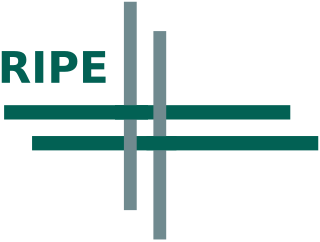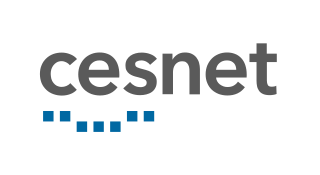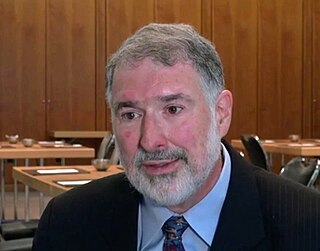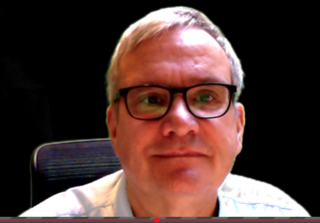
Réseaux IP Européens is a forum open to all parties with an interest in the technical development of the Internet. The RIPE community's objective is to ensure that the administrative and technical coordination necessary to maintain and develop the Internet continues. It is not a standards body like the Internet Engineering Task Force (IETF) and does not deal with domain names like ICANN.
The Centrum Wiskunde & Informatica is a research centre in the field of mathematics and theoretical computer science. It is part of the institutes organization of the Dutch Research Council (NWO) and is located at the Amsterdam Science Park. This institute is famous as the creation site of the programming language Python. It was a founding member of the European Research Consortium for Informatics and Mathematics (ERCIM).
NORDUnet is an international collaboration between the National research and education networks in the Nordic countries.
RIPE NCC (Réseaux IP Européens Network Coordination Centre) is the regional Internet registry (RIR) for Europe, the Middle East and parts of Central Asia. Its headquarters are in Amsterdam, Netherlands, with a branch office in Dubai, UAE.

The Trans-European Research and Education Networking Association was a not-for-profit association of European national research and education networks (NRENs) incorporated in Amsterdam, The Netherlands. The association was originally formed on 13 June 1986 as Réseaux Associés pour la Recherche Européenne (RARE) and changed its name to TERENA in October 1994. In October 2015, it again changed its name to GÉANT and at the same time acquired the shares of GEANT Limited.
EBONE was a pan-European Internet backbone. It went online in 1992 and was deactivated in July 2002. Some portions of the Ebone were sold to other companies and continue to operate today.

CESNET is developer and operator of national e-infrastructure for science, research, development and education in Czech Republic. The CESNET association was founded in 1996 by Czech public universities and the Academy of Sciences of the Czech Republic. An important part of CESNET's activities is research of advanced network technologies and applications from hybrid networking, programmable hardware, metacomputing to middleware and video transmissions. CESNET fulfils the role of NREN within the Czech Republic and represents it in international organisations such as the GÉANT Association, EGI and GLIF. CESNET is involved in the implementation of the European backbone network project called GÉANT. Within the Czech Republic CESNET fulfils the role of a coordinator of large infrastructures involved in the field of information technology.

IPv4 address exhaustion is the depletion of the pool of unallocated IPv4 addresses. Because the original Internet architecture had fewer than 4.3 billion addresses available, depletion has been anticipated since the late 1980s, when the Internet started experiencing dramatic growth. This depletion is one of the reasons for the development and deployment of its successor protocol, IPv6. IPv4 and IPv6 coexist on the Internet.

SURF is an organization that develops, implements and maintains the national research and education network (NREN) of the Netherlands, It operates the national research network formally called SURFnet.
EUnet was a very loose collaboration of individual European UNIX sites in the 1980s that evolved into the fully commercial entity EUnet International Ltd in 1996. It was sold to Qwest in 1998. EUnet played a decisive role in the adoption of TCP/IP in Europe beginning in 1988.

eduroam is an international Wi-Fi internet access roaming service for users in research, higher education and further education. It provides researchers, teachers, and students network access when visiting an institution other than their own. Users are authenticated with credentials from their home institution, regardless of the location of the eduroam access point. Authorization to access the Internet and other resources are handled by the visited institution. Users do not have to pay to use eduroam.
Delivery of Advanced Network Technology to Europe (DANTE) is a not-for-profit company that plans, builds and operates the consecutive generations of the backbone network that interconnects the national research and education networks (NRENs) in Europe. The organisation is based in Cambridge, United Kingdom and was formed in 1993 as a limited liability company owned by Réseaux Associés pour la Recherche Européenne (RARE). Ownership was transferred to a number of NRENs and government agencies in 1994.

Robert "Rob" Blokzijl was a Dutch physicist and computer scientist at the National Institute for Subatomic Physics (NIKHEF), and an early internet pioneer. He was founding member and chairman of RIPE, the Réseaux IP Européens, the European Internet Registrar organisation.

Glenn Ricart is a computer scientist. He was influential in the development of the Internet (ARPANET) going back to 1969 and early implementation of the TCP/IP protocol. Since then he has been active in technology and business as well as donating his time to philanthropic and educational movements.

François Flückiger is a French computer scientist who works at CERN. He was selected for induction in 2013 in the Internet Hall of Fame.
The NRENum.net service is an end-user ENUM service run by TERENA and the participating national research and education networking organisations (NRENs), primarily for academia. NRENum.net is considered as a complementary service and a valid alternative to the Golden ENUM tree. The domain nrenum.net is being populated in order to provide the infrastructure in DNS for storage of E.164 numbers. The NRENum.net service includes the operation of the Tier-0 root Domain Name Server(s) and the delegation of county codes to NRENum.net Registries. NRENum.net is a registered community trademark of TERENA.
eduGAIN is an international interfederation service interconnecting research and education identity federations. It enables the secure exchange of information related to identity, authentication and authorization between participating federations. The service is managed by a team led by TERENA. eduGAIN® is a registered trademark of DANTE.
Dorte Marianne Olesen is a Danish mathematician. In 1988 at Roskilde University, she became the first Danish woman to be appointed a full professor of mathematics. She has also played a leading role in the development of education and research networks, both in Denmark and at the European level.

Daniel Karrenberg is a German computer scientist and one of Europe's Internet pioneer who lives in the Netherlands.
A long-running debate in computer science known as the Protocol Wars occurred from the 1970s to the 1990s when engineers, organizations and nations became polarized over the issue of which communication protocol would result in the best and most robust computer networks. This culminated in the Internet–OSI Standards War in the late 1980s and early 1990s, which was ultimately "won" by the Internet protocol suite ("TCP/IP") by the mid-1990s and has since resulted in most other protocols disappearing.










